 您的购物车当前为空
您的购物车当前为空
Anti-Phospho-PI3 Kinase p110 beta (Ser1070) Polyclonal Antibody
一键复制产品信息别名 PtdIns-3-kinase subunit p110-beta, PtdIns-3-kinase subunit beta, PtdIns 3 kinase p110, p-PI3Kβ(Ser1070), p-PI3 Kinase p110 beta (Ser1070), p-PI3 Kinase p110 beta (S1070), PK3CB, Pik3cb, PIK3C1, PI3-kinase subunit beta, PI3-kinase p110 subunit beta, PI3KCB, PI3Kbeta, PI3K beta, PI3K, PI3 Kinase p110 beta (p-Ser1070), PI3 Kinase p110 beta (p-S1070), PI 3-kinase C2β, phosphoinositide 3 kinase catalytic beta polypeptide, Phosphatidylinositol-4, Phosphatidylinositol 4 5 bisphosphate 3 kinase catalytic subunit beta isoform, Phosphatidylinositol 4 5 bisphosphate 3 kinase 110 kDa catalytic subunit beta, Phosphatidylinositol 3 kinase catalytic beta polypeptide, p110beta, p110 BETA, 5-bisphosphate 3-kinase catalytic subunit beta isoform, 5-bisphosphate 3-kinase 110 kDa catalytic subunit beta
Anti-Phospho-PI3 Kinase p110 beta (Ser1070) Polyclonal Antibody 是一种 Rabbit 抗体,靶向 Phospho-PI3 Kinase p110 beta (Ser1070)。Anti-Phospho-PI3 Kinase p110 beta (Ser1070) Polyclonal Antibody 可用于 ICC/IF, IF, IHC-Fr, IHC-P, WB。
Anti-Phospho-PI3 Kinase p110 beta (Ser1070) Polyclonal Antibody
一键复制产品信息Anti-Phospho-PI3 Kinase p110 beta (Ser1070) Polyclonal Antibody 是一种 Rabbit 抗体,靶向 Phospho-PI3 Kinase p110 beta (Ser1070)。Anti-Phospho-PI3 Kinase p110 beta (Ser1070) Polyclonal Antibody 可用于 ICC/IF, IF, IHC-Fr, IHC-P, WB。
| 规格 | 价格 | 库存 | 数量 |
|---|---|---|---|
| 50 μL | ¥ 1,160 | 5日内发货 | |
| 100 μL | ¥ 1,975 | 5日内发货 | |
| 200 μL | ¥ 2,785 | 5日内发货 |
产品介绍
| 产品描述 | Anti-Phospho-PI3 Kinase p110 beta (Ser1070) Polyclonal Antibody is a Rabbit antibody targeting Phospho-PI3 Kinase p110 beta (Ser1070). Anti-Phospho-PI3 Kinase p110 beta (Ser1070) Polyclonal Antibody can be used in ICC/IF, IF, IHC-Fr, IHC-P, WB. |
| 别名 | PtdIns-3-kinase subunit p110-beta, PtdIns-3-kinase subunit beta, PtdIns 3 kinase p110, p-PI3Kβ(Ser1070), p-PI3 Kinase p110 beta (Ser1070), p-PI3 Kinase p110 beta (S1070), PK3CB, Pik3cb, PIK3C1, PI3-kinase subunit beta, PI3-kinase p110 subunit beta, PI3KCB, PI3Kbeta, PI3K beta, PI3K, PI3 Kinase p110 beta (p-Ser1070), PI3 Kinase p110 beta (p-S1070), PI 3-kinase C2β, phosphoinositide 3 kinase catalytic beta polypeptide, Phosphatidylinositol-4, Phosphatidylinositol 4 5 bisphosphate 3 kinase catalytic subunit beta isoform, Phosphatidylinositol 4 5 bisphosphate 3 kinase 110 kDa catalytic subunit beta, Phosphatidylinositol 3 kinase catalytic beta polypeptide, p110beta, p110 BETA, 5-bisphosphate 3-kinase catalytic subunit beta isoform, 5-bisphosphate 3-kinase 110 kDa catalytic subunit beta |
| Ig Type | IgG |
| 反应种属 | Human,Mouse,Rat (predicted:Chicken,Dog,Pig,Cow,Horse,GuineaPig) |
| 验证活性 | 1. Tissue/cell: human lung carcinoma; 4% Paraformaldehyde-fixed and paraffin-embedded; Antigen retrieval: citrate buffer (0.01M, pH6.0), Boiling bathing for 15 min; Block endogenous peroxidase by 3% Hydrogen peroxide for 30 min; Blocking buffer (normal goat serum) at 37°C for 20 min; Incubation: Anti-phospho-PI3 Kinase p110 beta (Ser1070) Polyclonal Antibody, Unconjugated (TMAB-01478) 1:200, overnight at 4°C, followed by conjugation to the secondary antibody and DAb staining. 2. Tissue/cell: human colon carcinoma; 4% Paraformaldehyde-fixed and paraffin-embedded; Antigen retrieval: citrate buffer (0.01M, pH6.0), Boiling bathing for 15 min; Block endogenous peroxidase by 3% Hydrogen peroxide for 30 min; Blocking buffer (normal goat serum) at 37°C for 20 min; Incubation: Anti-phospho-PI3 Kinase p110 beta (Ser1070) Polyclonal Antibody, Unconjugated (TMAB-01478) 1:200, overnight at 4°C, followed by conjugation to the secondary antibody and DAb staining. 3. Tissue/cell: human gastric carcinoma; 4% Paraformaldehyde-fixed and paraffin-embedded; Antigen retrieval: citrate buffer (0.01M, pH6.0), Boiling bathing for 15 min; Block endogenous peroxidase by 3% Hydrogen peroxide for 30 min; Blocking buffer (normal goat serum) at 37°C for 20 min; Incubation: Anti-phospho-PI3 Kinase p110 beta (Ser1070) Polyclonal Antibody, Unconjugated (TMAB-01478) 1:200, overnight at 4°C, followed by conjugation to the secondary antibody and DAb staining. 4. Paraformaldehyde-fixed, paraffin embedded (Mouse brain); Antigen retrieval by boiling in sodium citrate buffer (pH6.0) for 15 min; Block endogenous peroxidase by 3% hydrogen peroxide for 20 min; Blocking buffer (normal goat serum) at 37°C for 30 min; Antibody incubation with (phospho-PI3 Kinase p110 beta (Ser1070)) Polyclonal Antibody, Unconjugated (TMAB-01478) at 1:500 overnight at 4°C, followed by a conjugated secondary for 20 min and DAB staining. 5. Sample: Lane 1: Human MCF-7 cell lysates Lane 2: Human K562 cell lysates Primary: Anti-phospho-PI3 Kinase p110 beta (Ser1070) (TMAB-01478) at 1/1000 dilution Secondary: IRDye800CW Goat Anti-Rabbit IgG at 1/20000 dilution Predicted band size: 110-123 kDa Observed band size: 110 kDa 6. Paraformaldehyde-fixed, paraffin embedded (rat colon); Antigen retrieval by boiling in sodium citrate buffer (pH6.0) for 15 min; Block endogenous peroxidase by 3% hydrogen peroxide for 20 min; Blocking buffer (normal goat serum) at 37°C for 30 min; Antibody incubation with (phospho-PI3 Kinase p110 beta (Ser1070)) Polyclonal Antibody, Unconjugated (TMAB-01478) at 1:200 overnight at 4°C, followed by operating according to SP Kit (Rabbit) instructionsand DAB staining. 7. Paraformaldehyde-fixed, paraffin embedded (rat brain); Antigen retrieval by boiling in sodium citrate buffer (pH6.0) for 15 min; Block endogenous peroxidase by 3% hydrogen peroxide for 20 min; Blocking buffer (normal goat serum) at 37°C for 30 min; Antibody incubation with (phospho-PI3 Kinase p110 beta (Ser1070)) Polyclonal Antibody, Unconjugated (TMAB-01478) at 1:200 overnight at 4°C, followed by operating according to SP Kit (Rabbit) instructionsand DAB staining. 8. Paraformaldehyde-fixed, paraffin embedded (rat kidney); Antigen retrieval by boiling in sodium citrate buffer (pH6.0) for 15 min; Block endogenous peroxidase by 3% hydrogen peroxide for 20 min; Blocking buffer (normal goat serum) at 37°C for 30 min; Antibody incubation with (phospho-PI3 Kinase p110 beta (Ser1070)) Polyclonal Antibody, Unconjugated (TMAB-01478) at 1:200 overnight at 4°C, followed by operating according to SP Kit (Rabbit) instructionsand DAB staining. 9. Paraformaldehyde-fixed, paraffin embedded (mouse colon); Antigen retrieval by boiling in sodium citrate buffer (pH6.0) for 15 min; Block endogenous peroxidase by 3% hydrogen peroxide for 20 min; Blocking buffer (normal goat serum) at 37°C for 30 min; Antibody incubation with (phospho-PI3 Kinase p110 beta (Ser1070)) Polyclonal Antibody, Unconjugated (TMAB-01478) at 1:200 overnight at 4°C, followed by operating according to SP Kit (Rabbit) instructionsand DAB staining. 10. Paraformaldehyde-fixed, paraffin embedded (mouse kidney); Antigen retrieval by boiling in sodium citrate buffer (pH6.0) for 15 min; Block endogenous peroxidase by 3% hydrogen peroxide for 20 min; Blocking buffer (normal goat serum) at 37°C for 30 min; Antibody incubation with (phospho-PI3 Kinase p110 beta (Ser1070)) Polyclonal Antibody, Unconjugated (TMAB-01478) at 1:200 overnight at 4°C, followed by operating according to SP Kit (Rabbit) instructionsand DAB staining. 11. A431 cell; 4% Paraformaldehyde-fixed; Triton X-100 at room temperature for 20 min; Blocking buffer (normal goat serum) at 37°C for 20 min; Antibody incubation with (phospho-PI3 Kinase p110 beta (Ser1070)) polyclonal Antibody, Unconjugated (TMAB-01478) 1:50, 90 minutes at 37°C; followed by a conjugated Goat Anti-Rabbit IgG antibody at 37°C for 90 minutes, DAPI (blue) was used to stain the cell nucleus. 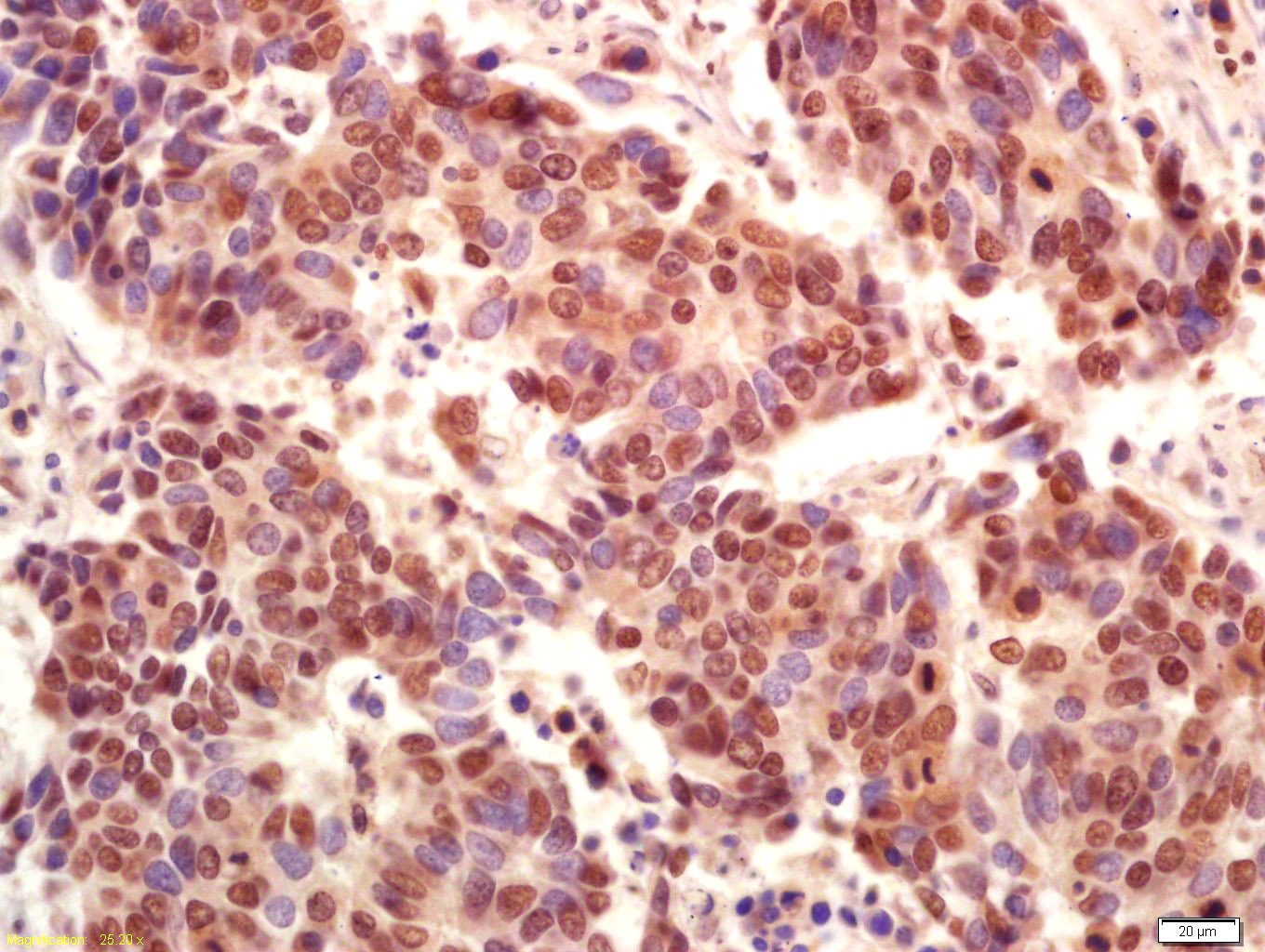 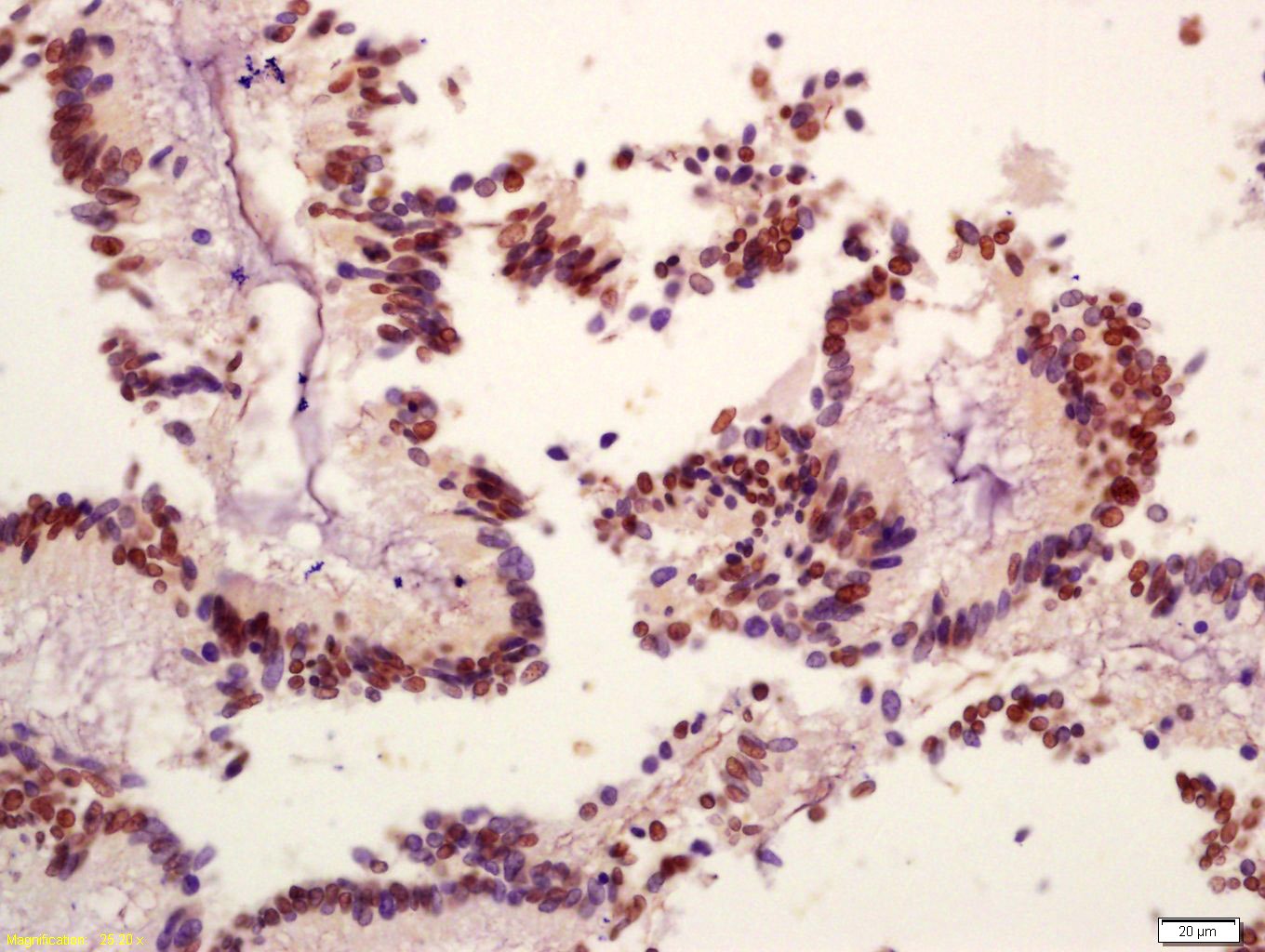 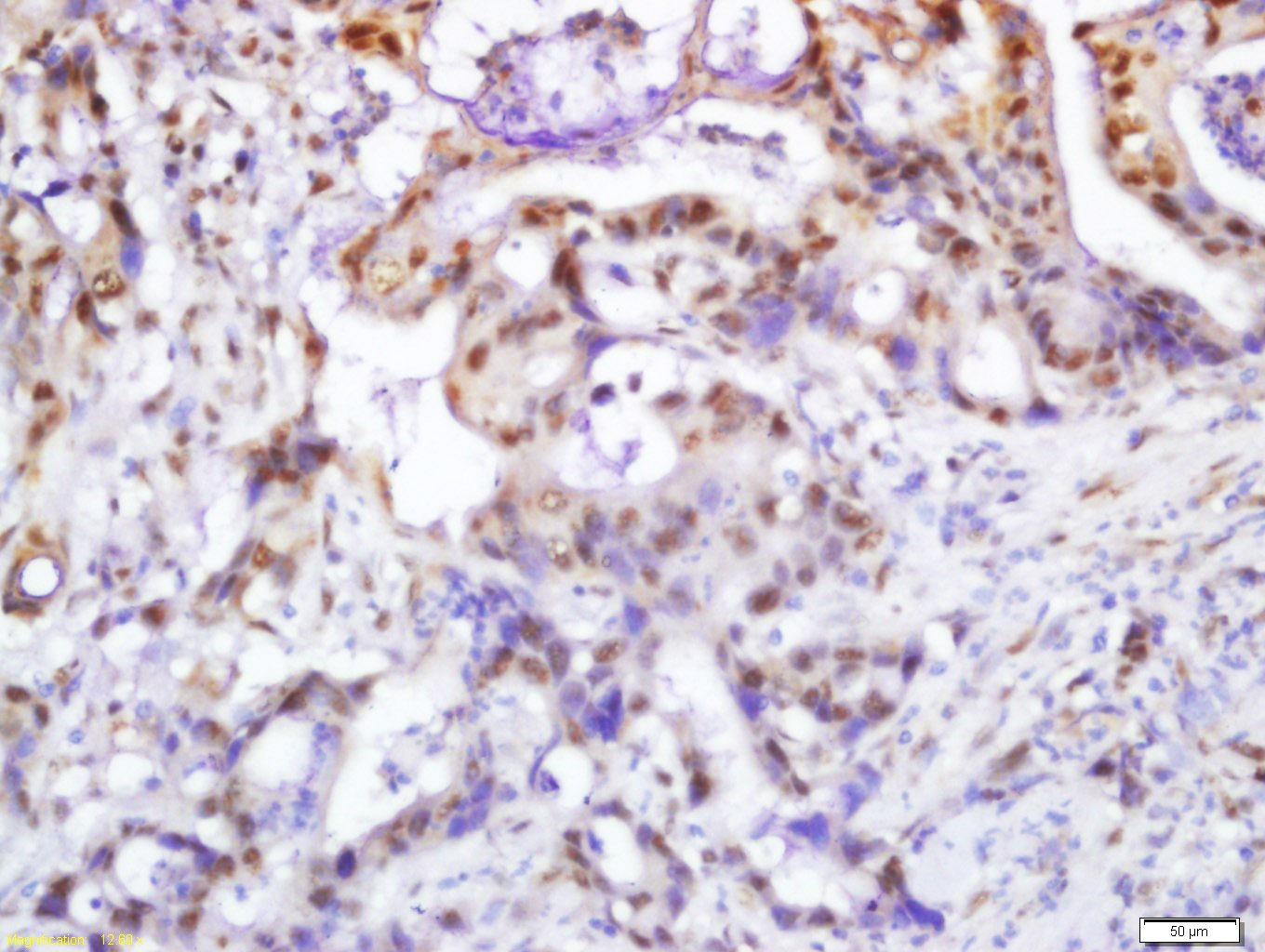 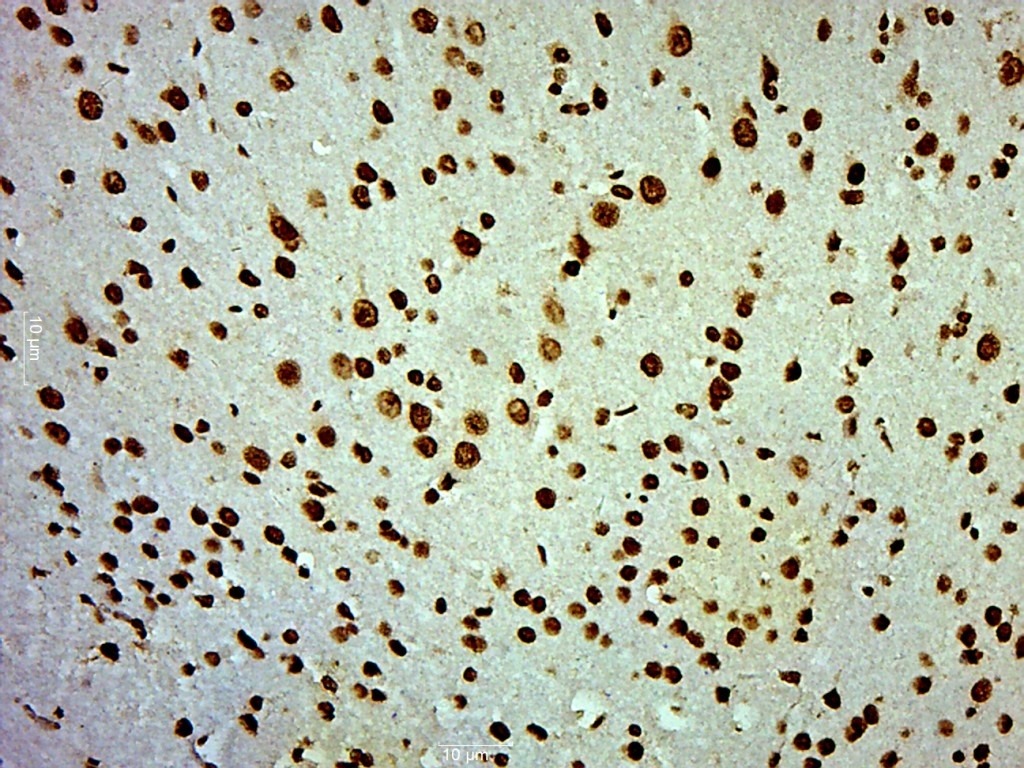 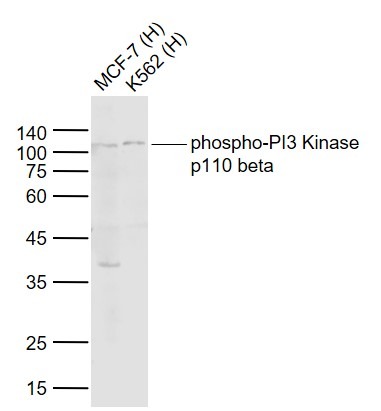 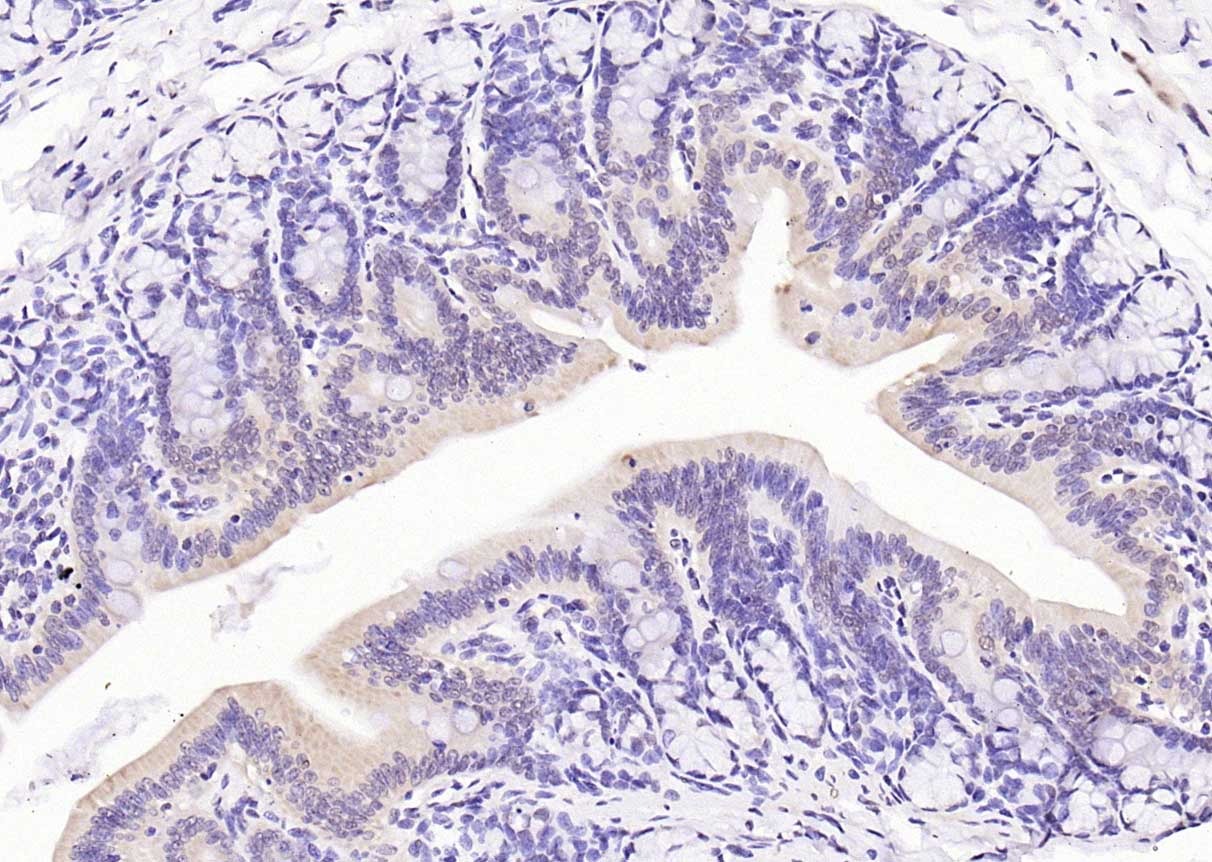 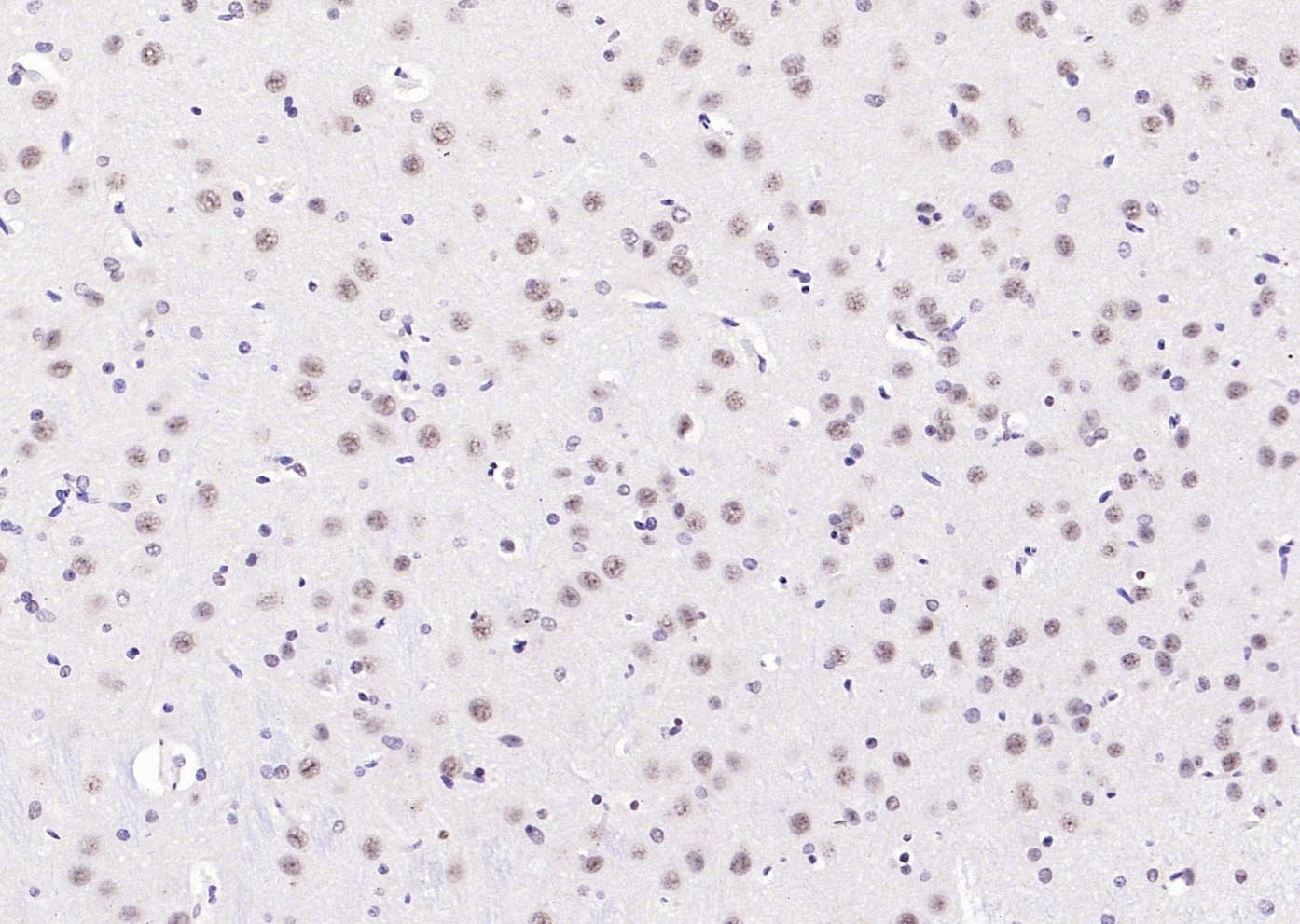 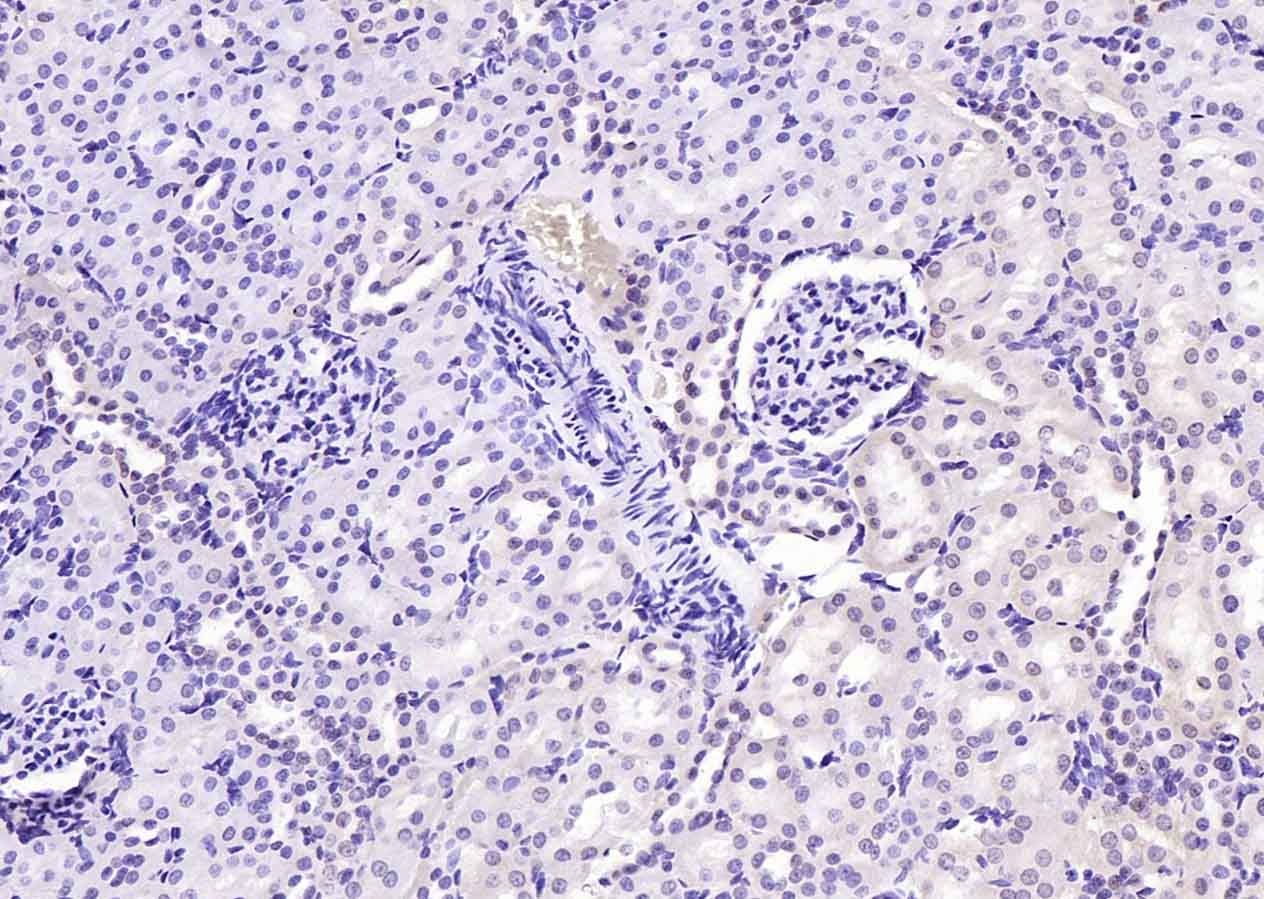 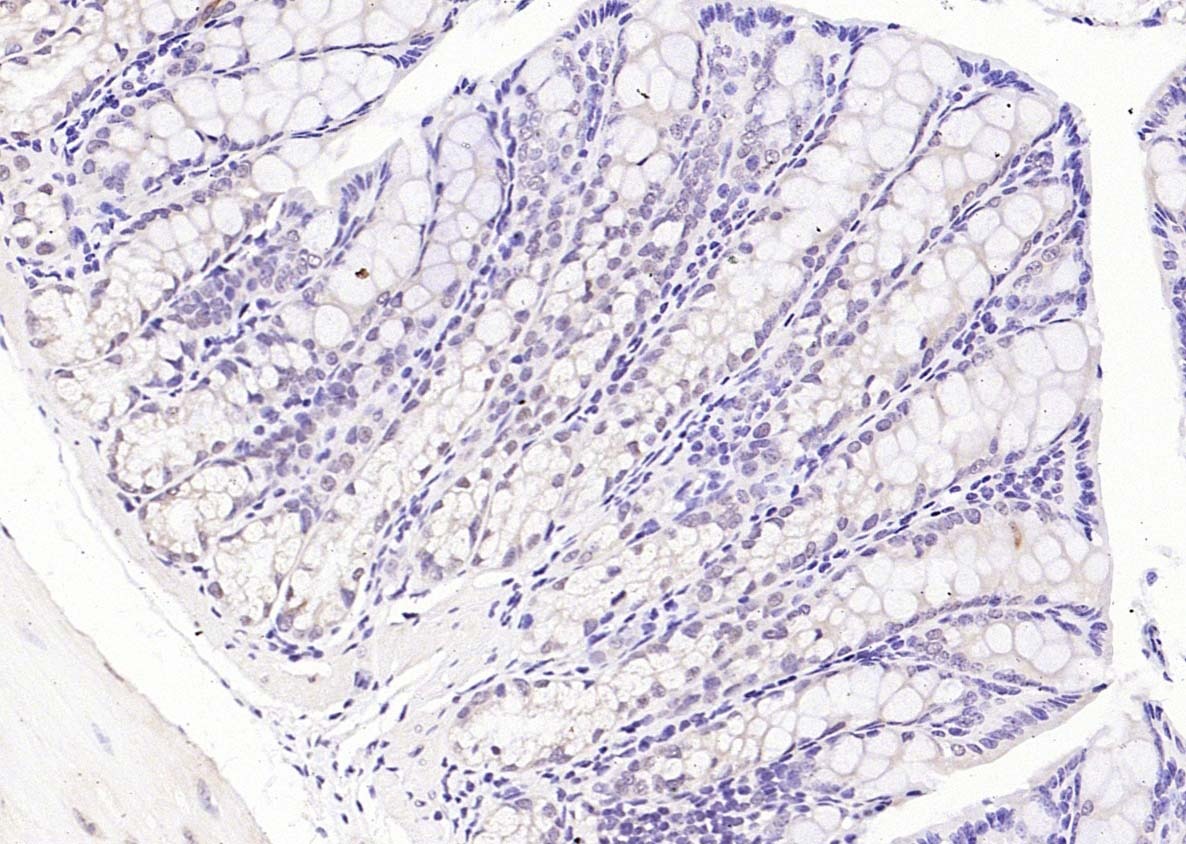 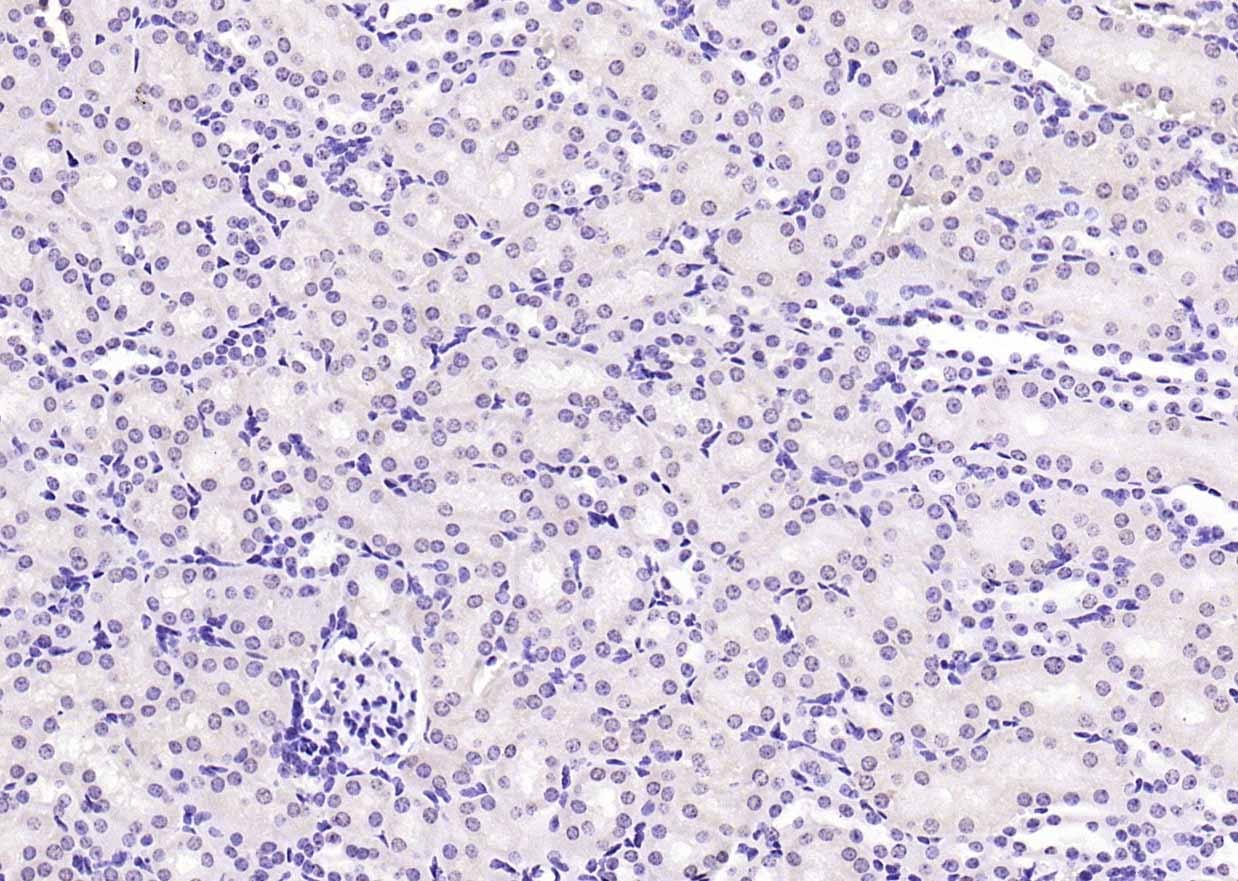 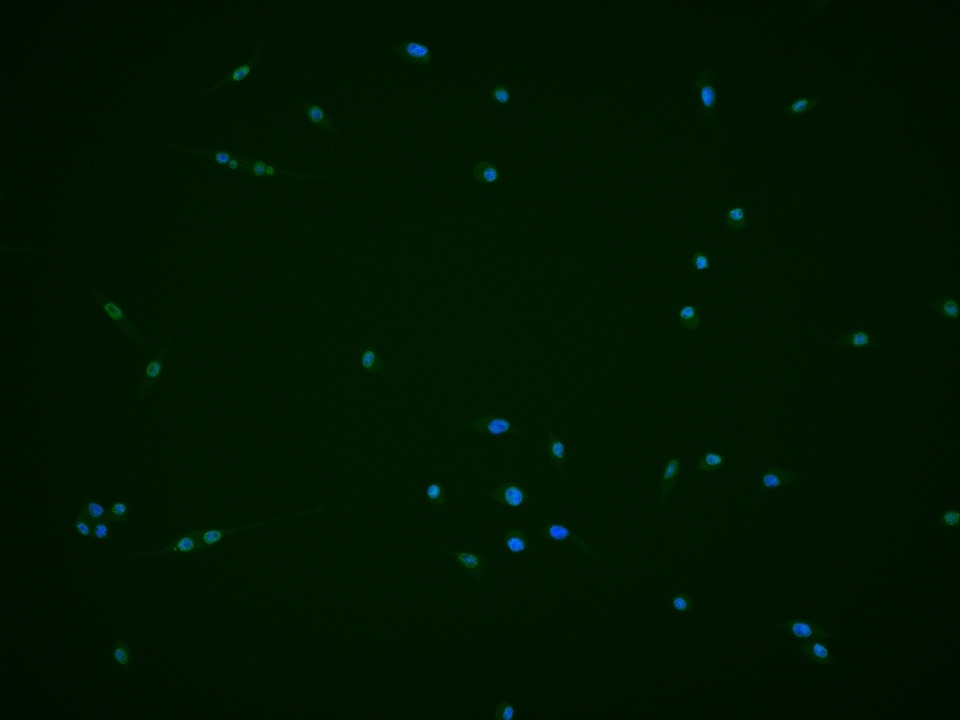 |
| 应用 | ICC/IFIFIHC-FrIHC-PWB |
| 推荐剂量 | ICC/IF=1:100-500; IF=1:100-500; IHC-Fr=1:100-500; IHC-P=1:100-500; WB=1:500-2000 |
| 抗体种类 | Polyclonal |
| 宿主来源 | Rabbit |
| 亚细胞定位 | Cytoplasm. Nucleus. Note=Interaction with PIK3R2 is required for nuclear localization and export. |
| 组织特异性 | Expressed ubiquitously. |
| 构建方式 | Polyclonal Antibody |
| 纯化方式 | Protein A purified |
| 性状 | Liquid |
| 缓冲液 | 0.01M TBS (pH7.4) with 1% BSA, 0.02% Proclin300 and 50% Glycerol. |
| 浓度 | 1 mg/mL |
| 研究背景 | This gene encodes an isoform of the catalytic subunit of phosphoinositide 3-kinase (PI3K). These kinases are important in signaling pathways involving receptors on the outer membrane of eukaryotic cells and are named for their catalytic subunit. The encoded protein is the catalytic subunit for PI3Kbeta (PI3KB). PI3KB has been shown to be part of the activation pathway in neutrophils which have bound immune complexes at sites of injury or infection. Alternative splicing results in multiple transcript variants. [provided by RefSeq, Dec 2011]. |
| 免疫原 | KLH conjugated synthesised phosphopeptide: human PI3 Kinase p110 beta around the phosphorylation site of Ser1070 |
| 抗原种属 | Human |
| 基因名称 | PIK3CB |
| 基因ID | |
| 蛋白名称 | Phosphatidylinositol 4, 5-bisphosphate 3-kinase catalytic subunit beta isoform |
| Uniprot ID | |
| 研究领域 | Kinases/Phosphatases,TLR Signaling,Other Kinases,Lipid Kinases |
| 功能 | Phosphoinositide-3-kinase (PI3K) that phosphorylates PtdIns (Phosphatidylinositol), PtdIns4P (Phosphatidylinositol 4-phosphate) and PtdIns(4,5)P2 (Phosphatidylinositol 4,5-bisphosphate) to generate phosphatidylinositol 3,4,5-trisphosphate (PIP3). PIP3 plays a key role by recruiting PH domain-containing proteins to the membrane, including AKT1 and PDPK1, activating signaling cascades involved in cell growth, survival, proliferation, motility and morphology. Involved in the activation of AKT1 upon stimulation by G-protein coupled receptors (GPCRs) ligands such as CXCL12, sphingosine 1-phosphate, and lysophosphatidic acid. May also act downstream receptor tyrosine kinases. Required in different signaling pathways for stable platelet adhesion and aggregation. Plays a role in platelet activation signaling triggered by GPCRs, alpha-IIb/beta-3 integrins (ITGA2B/ ITGB3) and ITAM (immunoreceptor tyrosine-based activation motif)-bearing receptors such as GP6. Regulates the strength of adhesion of ITGA2B/ ITGB3 activated receptors necessary for the cellular transmission of contractile forces. Required for platelet aggregation induced by F2 (thrombin) and thromboxane A2 (TXA2). Has a role in cell survival. May have a role in cell migration. Involved in the early stage of autophagosome formation. Modulates the intracellular level of PtdIns3P (Phosphatidylinositol 3-phosphate) and activates PIK3C3 kinase activity. May act as a scaffold, independently of its lipid kinase activity to positively regulate autophagy. May have a role in insulin signaling as scaffolding protein in which the lipid kinase activity is not required. May have a kinase-independent function in regulating cell proliferation and in clathrin-mediated endocytosis. Mediator of oncogenic signal in cell lines lacking PTEN. The lipid kinase activity is necessary for its role in oncogenic transformation. Required for the growth of ERBB2 and RAS driven tumors. |
| 分子量 | Theoretical: 110-123 kDa. |
| 储存方式 | Store at -20°C or -80°C for 12 months. Avoid repeated freeze-thaw cycles. |
| 运输方式 | Shipping with blue ice. |





 还可以
还可以
 |
|